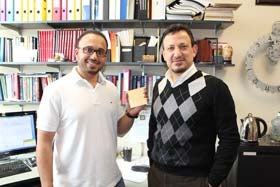Wednesday, April 15, 2015
Findings
by
electrical
and
computer
engineering
researchers
show
that
in
the
future
clean
alternatives
such
as
harvesting
energy
from
electromagnetic
waves
may
help
ease
the
world’s
energy
shortage
Research
published
this
week
in
the
journal
Applied
Physics
Letters
by
 Omar
Ramahi,
right,
a
Waterloo
electrical
and
computer
engineering
professor,
and
Thamer
Almoneef,
a
doctoral
candidate,
include
a
novel
design
for
electromagnetic
energy
harvesting
based
on
the
"full
absorption
concept."
This
involves
the
use
of
metamaterials
that
can
be
tailored
to
produce
media
that
neither
reflects
nor
transmits
any
power—enabling
full
absorption
of
incident
waves
at
a
specific
range
of
frequencies
and
polarizations.
Omar
Ramahi,
right,
a
Waterloo
electrical
and
computer
engineering
professor,
and
Thamer
Almoneef,
a
doctoral
candidate,
include
a
novel
design
for
electromagnetic
energy
harvesting
based
on
the
"full
absorption
concept."
This
involves
the
use
of
metamaterials
that
can
be
tailored
to
produce
media
that
neither
reflects
nor
transmits
any
power—enabling
full
absorption
of
incident
waves
at
a
specific
range
of
frequencies
and
polarizations.

"The
growing
demand
for
electrical
energy
around
the
globe
is
the
main
factor
driving
our
research,"
said
Almoneef
in
the
journal
article.
"More
than
80
per
cent
of
our
energy
today
comes
from
burning
fossil
fuels,
which
is
both
harmful
to
our
environment
and
unsustainable
as
well.
In
our
group,
we’re
trying
to
help
solve
the
energy
crisis
by
improving
the
efficiency
of
electromagnetic
energy-harvesting
systems."
The
key
significance
of
the
researchers’
work
is
that
it
demonstrates
for
the
first
time
that
it’s
possible
to
collect
essentially
all
of
the
electromagnetic
energy
that
falls
onto
a
surface.
"Conventional
antennas
can
channel
electromagnetic
energy
to
a
load—but
at
much
lower
energy
absorption
efficiency
levels,"
said
Ramahi.
"We
can
also
channel
the
absorbed
energy
into
a
load,
rather
than
having
the
energy
dissipate
in
the
material
as
was
done
in
previous
works."